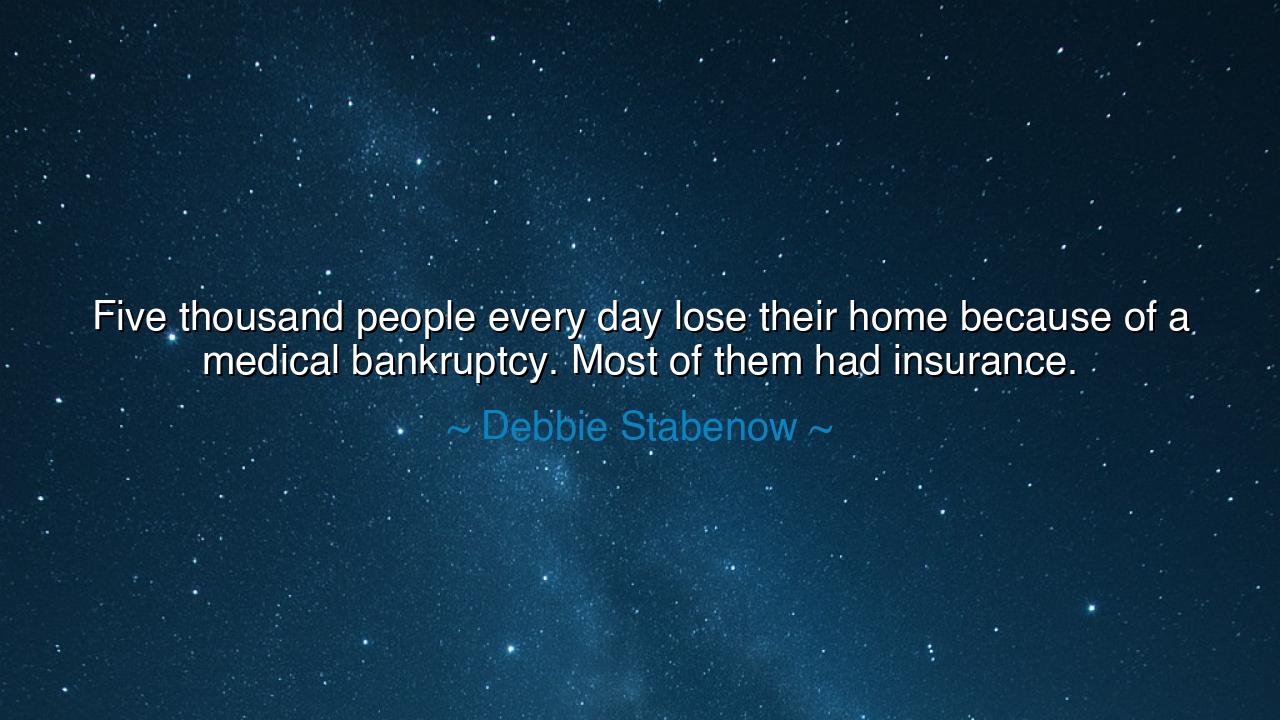
Five thousand people every day lose their home because of a
Five thousand people every day lose their home because of a medical bankruptcy. Most of them had insurance.






The words of Debbie Stabenow—“Five thousand people every day lose their home because of a medical bankruptcy. Most of them had insurance”—resound not only as a political truth, but as a moral lament for our age. They are a cry for justice disguised as a statement of fact. Beneath their surface lies a grief that touches the heart of civilization itself: that in a world of progress and abundance, human beings can still be ruined by illness, not because nature has struck them down, but because society has failed to lift them up. Stabenow’s words pierce the illusion of security, reminding us that even those who believe themselves protected—those who “had insurance”—can find their lives unraveling when the system meant to heal becomes a burden that destroys.
To understand the gravity of this truth, we must recall the world from which it was spoken. Debbie Stabenow, a U.S. Senator and lifelong advocate for healthcare reform, uttered these words in the early 21st century, amid fierce national debates about medical costs and the reach of compassion in governance. She spoke not in abstraction, but from the witness of countless citizens—families who had worked hard, paid their dues, and trusted that the safety nets of modernity would catch them when they fell. Yet they discovered, too late, that the nets were torn. The system that promised care delivered debt, and the cure became more ruinous than the disease itself.
In her words, we hear echoes of the ancient struggles between wealth and mercy. In every civilization, there have been moments when the temple of commerce overshadowed the temple of humanity. In Rome, the poor who fell ill often sold themselves into bondage to afford treatment. In medieval Europe, the sick were cast from their homes to die by the roadside, while nobles sought blessings in gold-plated chapels. And now, in the modern world, the tragedy endures under a new name: medical bankruptcy. It is the same cruelty, reborn in bureaucracy—the idea that human worth can be tallied in ledgers, that the pain of the sick may be measured in profit.
Consider the story of Elizabeth Warren’s early research into American bankruptcies, which revealed that the majority were caused by medical bills—and that most victims, as Stabenow reminds us, had health insurance. One such family, a husband and wife in middle America, both working, both insured, saw their lives shattered when the husband was diagnosed with cancer. They paid every premium faithfully, yet when the illness came, the fine print devoured their savings. Their home, the symbol of their stability, was taken to pay for treatments that prolonged but could not save. They lost not only a house but their sense of safety, their trust in the fairness of the world. Their story is not an anomaly—it is the unspoken chorus behind Stabenow’s words.
What she reveals is not merely an economic issue, but a moral sickness—the erosion of empathy in systems built to serve. When the weak suffer so that the strong may profit, when illness becomes an industry, then the spirit of a nation falters. For what is the worth of prosperity if it cannot protect the body and soul of its people? The ancients taught that the health of a society is measured not by its wealth, but by how it treats its most vulnerable. Hippocrates himself declared that the purpose of medicine is to cure sometimes, to relieve often, and to comfort always. Yet in our time, comfort has a price tag, and relief must be negotiated through paperwork and debt.
Stabenow’s quote also carries a warning: that false security breeds complacency. Those who believe they are safe because they “have insurance” forget how fragile the system truly is. Like a fortress built on sand, it may stand in peace but crumble in crisis. Her words call us to awaken—to demand not charity, but justice, not pity, but policy grounded in compassion. She invites us to remember that healthcare is not a privilege for the prosperous, but a right born of humanity itself. The lesson of her lament is that a civilization cannot call itself free if illness is a cause of poverty and pain a path to ruin.
The lesson, then, is both moral and practical: we must rebuild the foundations of care. Let no person lose their home because they sought to save their life. Let the healer’s oath guide not only the doctor but the state—to do no harm, to heal without exploiting. Every citizen, whether powerful or poor, must lend their voice to demand systems that honor life over profit. For a society that bankrupts the sick bankrupts its own soul.
So, my child, when you hear these words of Debbie Stabenow, do not take them as statistics—they are sacred testimony. Remember the families behind the numbers, the children who watched their homes vanish, the elders who traded comfort for survival. Carry their story as a torch in your heart. For the greatness of a nation, like the greatness of a human being, is not in how much it possesses, but in how much it protects. And until no one is ruined for the sin of being ill, the work of compassion remains unfinished—and the call of justice, unanswered.






AAdministratorAdministrator
Welcome, honored guests. Please leave a comment, we will respond soon